The Iowa Golf Hall of Fame will add three members in 2021, bringing the total number in the Hall of Fame to 89. Those three include Chad Proehl, Jerry Johnson and Jim Carney. These three individuals will be enshrined during a ceremony later this year (Date TBD). Details for the event are still being worked out, but it is the hope of the IGA that a ‘double-ceremony’ can be held honoring the Class of 2020 and 2021. The ceremony for the Class of 2020 was postponed until this year due to concerns about the coronavirus with travel and congregating in large groups. We will post details regarding the induction as soon as they are finalized.
 Chad Proehl
Chad Proehl
Chad Proehl (right), originally from Atlantic, continues to add to his distinguished playing and teaching career. A 1985 Iowa High School champion and 1990 All-American at Grand View University, Proehl, has proven to be one of the top players in not only the Iowa PGA Section but also nationally.
Proehl has competed in 14 National PGA Club Professional Championships, won the Iowa PGA Section Championship three times, two-time Iowa PGA Match Play Champion, three-time Iowa PGA Section Player of the Year, Herman Sani Champion, 12-time Iowa Cup Team Member, 2019 Iowa Section Senior Champion, two-time Iowa PGA Senior Player of the Year, has played in four PGA Tour John Deere Classic Tournaments and competed in four PGA Champions Tour events.
Proehl, who has been the PGA Teaching Professional at Sugar Creek Golf Course (Waukee)for the past 12 years, has also made a positive impact on the game of golf in Iowa through his instruction.
“Chad’s contributions to the game go beyond his playing accomplishments,” Iowa PGA Section Executive Director Greg Mason said. “Chad spent the majority of his early career in golf as a Head Professional or Director of Golf. His time was spent teaching, mentoring and guiding those respective facilities. Chad continually has been a volunteer for wherever the Iowa PGA needed assistance including our Iowa PGA Junior Academy.”
Aaron Krueger, Immediate Past President of the Iowa PGA Section and Director of Golf at Des Moines’ Wakonda Club echoed Mason’s words on what Proehl has meant to the game of golf in Iowa.
“Working as a Head Professional, Director of Golf and Teaching Professional, Chad has touched many lives over his 30-year career,” Krueger said. “A passion to teach and a passion to compete are the trademarks of him professionally. His infectious smile, friendly disposition and outgoing personality are the trademarks of him personally.”
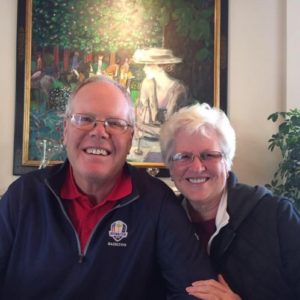 Jerry Johnson
Jerry Johnson
Jerry Johnson (left with wife Deb) stood tall and always put the game of golf first.
Following a brief career in the banking industry, Jerry Johnson changed gears and entered the golf business, becoming a PGA apprentice under Keith Hannan at Mason City Country Club in 1976. From 1980-1985 he was the Head PGA Professional at Lake Bracken Country Club in Galesburg, IL. When Joe August retired as golf professional of Marshalltown’s Elmwood Country Club in the fall of 1985, Jerry was hired to take over the reins. He enjoyed working at Elmwood C.C. for 29 years before retiring on December 31, 2014, achieving “Life Membership” status in the PGA of America.
Following retirement, Jerry stayed active in giving back to the game – serving on the Iowa Golf Hall of Fame Nominating Committee, Iowa PGA Strategic Planning Committees and other activities.
Jerry, who passed away in July of 2020, will be remembered most for his passion in promoting the game of golf to the Marshalltown community. Be it a listening ear while golfers recounted their rounds to him, spending many hours giving lessons on the practice tee, administering golf events, teaching area high school golf teams and P.E. classes in proper swing execution and golf etiquette, and helping to implement the Swings with Kids program in Marshalltown schools, he wanted to share his love of the game and impart its many life lessons.
“His contributions to the game are unsung and not always seen,” Greg Mason, IPGA Section Executive Director said. “He has been in my ear for 15 years to find a way to grow our game with all of our allied associations. I believe if you truly examine his career you note that Jerry never put himself first. He always put his family first, his members first, his PGA Professionals first, but always put the good of the game at the top of that list!”
Jerry’s love of competition also fostered years of participating in amateur and professional tournaments. Two highlights include playing in the Quad Cities Open twice and the National PGA Club Professional Championship four times.
Jerry was also very instrumental in the success of the Lennox / Quakerdale Pro-Am Invitational, held at Elmwood CC. His contributions behind the scenes have helped the event raise more than $2,000,000 in the 30+ years at Elmwood.
“Golf has always been an incredible passion for Jerry and it showed time and time again as the attendees, including all the many PGA professionals that participate annually, have always experienced a great time,” Lee Eft, General Chairman of the Lennox / Quakerdale Pro-Am Invitational said. “He was always a pleasure to work with and worked tirelessly to make the event a great success.”
The Iowa Golf Association named Jerry the Golf Professional of the Year in 1990. That same year he was named Iowa PGA Merchandiser of the Year by the Iowa PGA. Jerry held the office of President of the Iowa PGA from 1991-1993 and was chosen by his peers in 1992 as the Iowa Section PGA Professional of the Year. In 2016 he received the IPGA Horton Smith Award.
“You will be hard pressed to find someone within the state that doesn’t know who Jerry Johnson is,” Jay Giannetto, PGA Professional at Elmwood CC said. “It would be even more difficult to find someone who doesn’t love and respect who he is as a person. Jerry’s passion for golf and his desire to help people is truly inspirational.”
 Jim Carney
Jim Carney
Jim Carney (right), originally from Centerville, began his dominance on the golf course in the early 1960s and continued to be a feared, yet well-respected opponent for decades.
Carney captured the 1964 Iowa High School Individual championship and added the Iowa Junior championship a year later in 1965. Carney also added his name to the national stage in 1965, advancing to the quarterfinals of the U.S. Junior Amateur Championship at the Country Club of California. Over a four-year period in high school, Carney was medalist in 18 straight meets.
Three years later, following numerous wins around the state including a 1967 Northwest Amateur victory, Carney, at the age of 19, won the 1968 Iowa Amateur at Dubuque Golf & Country Club. In 1970, as a member of the University of Iowa golf team, Carney qualified for the NCAA Championship and finished runner-up in the NCAA long drive contest (lost to Bobby Valentine – future PGA Tour player).
Carney was selected to play on the Army Golf Team in 1970, being one of six chosen. Those other five selected went on to play professionally on the PGA Tour. Carney served in the U.S. Army from 1970-1972. Following his service, Carney attended and graduated from Drake University Law School in 1975. From 1965-1975 Carney won over 100 one-day 27-hole ‘Minnow’ tournaments across the state.
“Jim’s playing record speaks for itself,” Iowa Golf Hall of Fame member Ken Schall said. “The mere fact that he won a State High School Championship, a State Amateur and a State Junior puts him in rarified air.”
Not only was Carney’s playing resume excellent, his contributions off the course to the game of golf in Iowa continue to be nothing short of tremendous.
As an attorney, Carney has been crucial over the years surrounding legislative efforts and golf, such as tax issues and environmental restrictions. He has also been a main point of contact in development of an “Iowa Golf Day” at the statehouse.
“Jim committed everything he had into building a successful law practice and the time he used to spend golfing was spent in the law library preparing for trials,” Iowa Golf Hall of Fame member Mike McCoy said. “His dedication and professionalism were yet another example of how life should be lived. I have no doubts that had Jim continued to commit his time to golf his impressive list of wins would be much longer.”
In 2020, Jim was an invaluable resource for clarifications on proclamations issued by the Governor surrounding the COVID-19 pandemic. It is not a stretch to say that from late March to late May 2020, the IGA, on behalf of the Iowa Golf Council, was on the phone with Carney three to four times a week gaining some clarification on how golf courses were allowed to operate. We know that he played a large part in keeping our sport up and operating when many other businesses were forced to shut down.
It is also worth noting that Jim has performed this work on behalf of the IGA and golf pro-bono, and even makes substantial contributions to many golf-related endeavors, in addition to his volunteer work. He has proven his dedication to the game of golf over and over again, and for that the game of golf in Iowa is much better off and extremely grateful.
“These are just some of the examples of Jim’s generosity and commitment to golf and his love of the game.,” Iowa Golf Hall of Fame member Dave Sergeant said. “Jim has done these things quietly and without seeking any accolades or recognition. He’s been a humble giant in doing all this.”
The Iowa Golf Hall of Fame is administered by the Iowa Golf Association on behalf of all golf organizations in and around the state, such as the Iowa Section PGA and the Iowa Golf Course Superintendents Association.
The nomination and induction process consists of two committees, the Nominating Committee and the Voting Committee. The Nominating Committee determines the eligibility of nominees submitted by the general public as well as identifies individuals to nominate. They finalize the ballot. The Voting Committee has the task of researching and studying those on the ballot and casting votes for induction. The Voting Committee consists entirely of individuals who are current members of the Iowa Golf Hall of Fame.



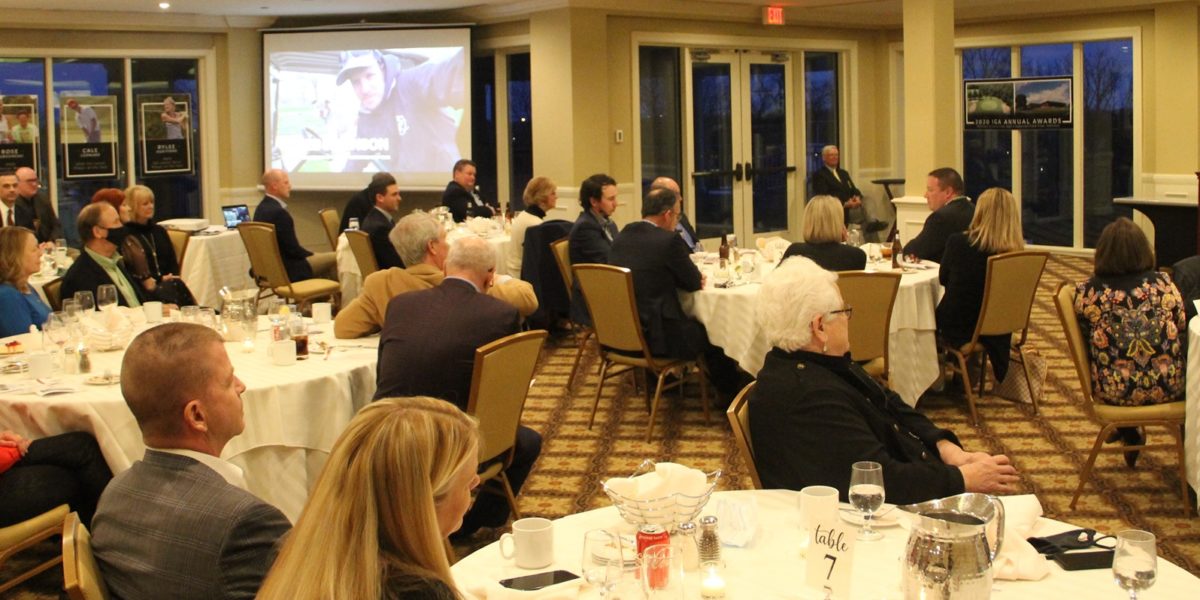
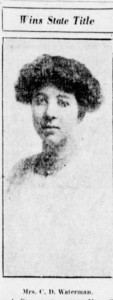 Both the 1922 and 1923 events were invitationals. The first true Women’s State Amateur championship took place in August of 1924 at the Cedar Rapids Country Club. The entry fee was 50 cents. Mrs. C.D. Waterman (pictured right) of Davenport beat Byers in a dramatic 19-hole match.
Both the 1922 and 1923 events were invitationals. The first true Women’s State Amateur championship took place in August of 1924 at the Cedar Rapids Country Club. The entry fee was 50 cents. Mrs. C.D. Waterman (pictured right) of Davenport beat Byers in a dramatic 19-hole match.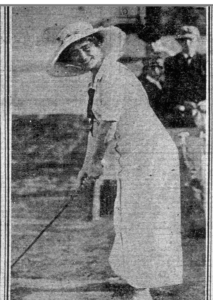 Jones (pictured left) beat Mrs. W.F. Moore of Des Moines, 8 and 6, in the final.
Jones (pictured left) beat Mrs. W.F. Moore of Des Moines, 8 and 6, in the final.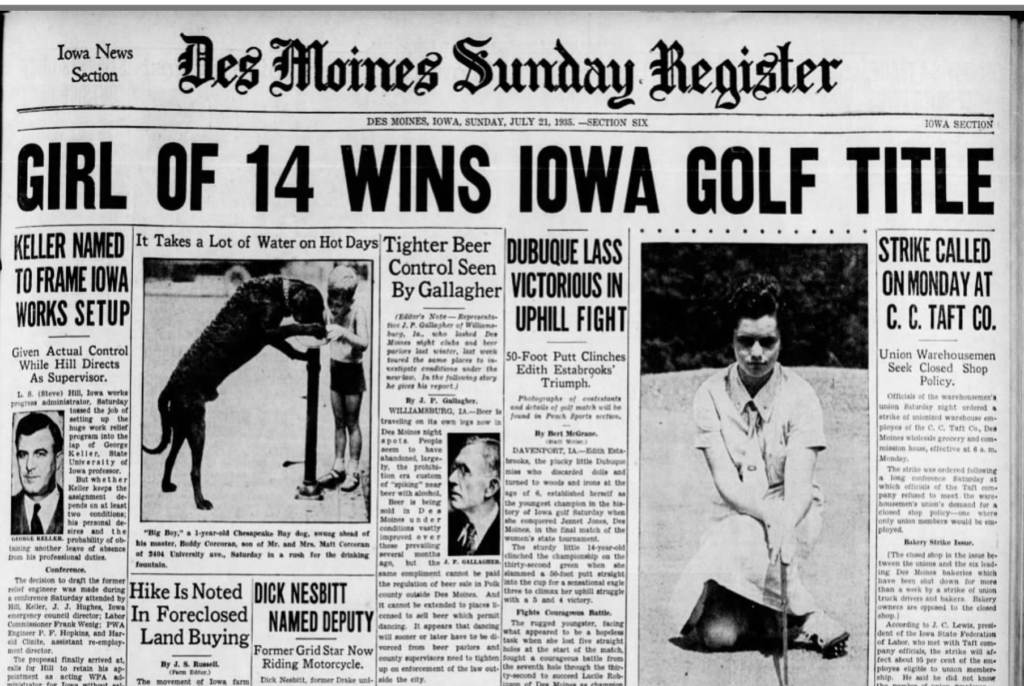
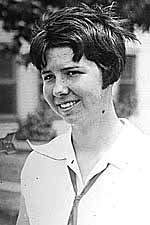 Lucile Robinson (left) of Des Moines came to the 1935 championship at the Davenport Country Club as an overwhelming favorite. She’d won her first title in 1929, was a runner-up in 1930 and then won the next four championships. That gave her a 20-match winning streak. Fourteen of them didn’t get past the 14th hole.
Lucile Robinson (left) of Des Moines came to the 1935 championship at the Davenport Country Club as an overwhelming favorite. She’d won her first title in 1929, was a runner-up in 1930 and then won the next four championships. That gave her a 20-match winning streak. Fourteen of them didn’t get past the 14th hole.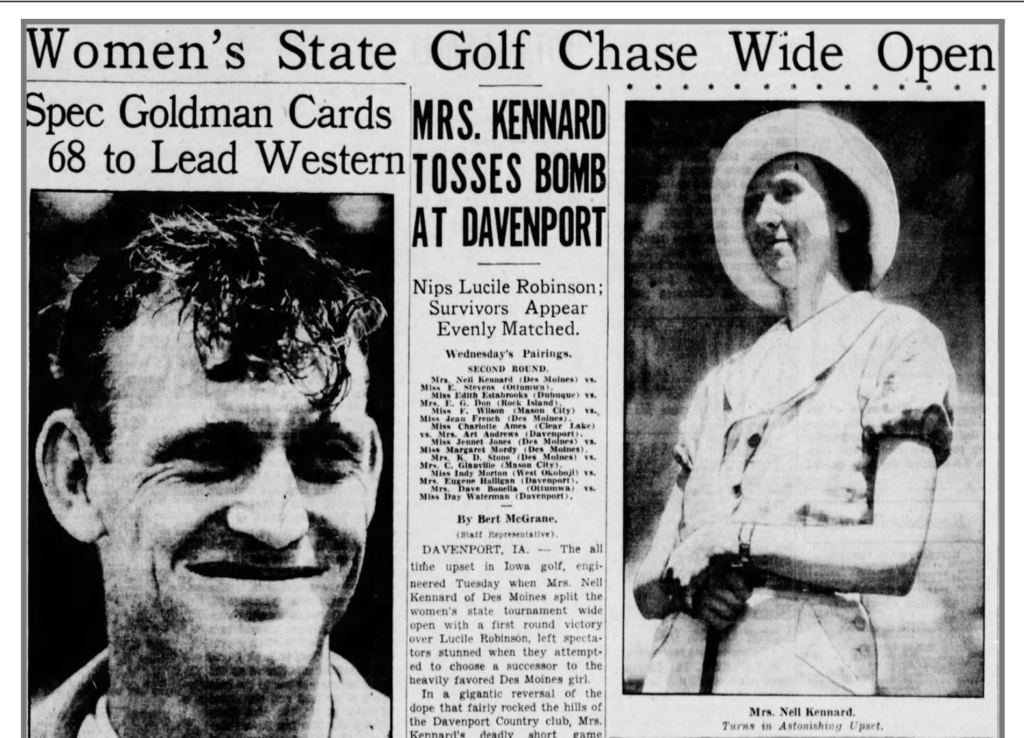
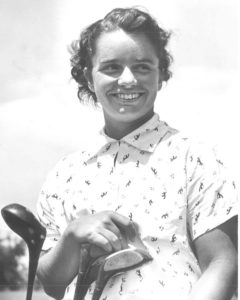 Estabrooks (right) ended her first-round match on the 12th hole. Her second ended on the 16th. And she dispatched of Stevens, 6 and 5. Her semifinal foe was Charlotte Ames of Clear Lake, who attended the University of Minnesota. Estabrooks won, 7 and 6.
Estabrooks (right) ended her first-round match on the 12th hole. Her second ended on the 16th. And she dispatched of Stevens, 6 and 5. Her semifinal foe was Charlotte Ames of Clear Lake, who attended the University of Minnesota. Estabrooks won, 7 and 6.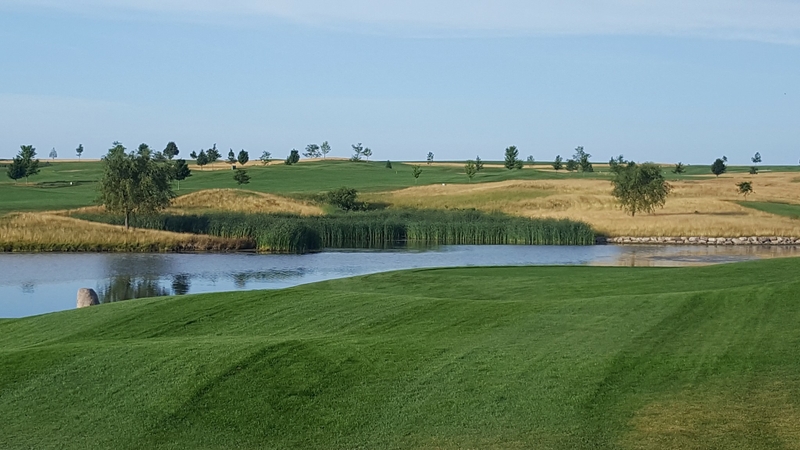
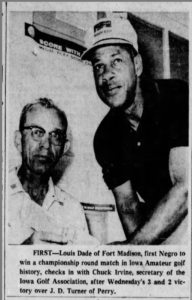 The following feature on Louis Dade was written by 11-time Iowa Sportswriter of the Year Rick Brown and shared recently with Iowa Golf Association. The legacy of Louis Dade continues the celebration of Black History Month, an annual celebration of achievements by African Americans and a time for recognizing their central role in U.S. history.
The following feature on Louis Dade was written by 11-time Iowa Sportswriter of the Year Rick Brown and shared recently with Iowa Golf Association. The legacy of Louis Dade continues the celebration of Black History Month, an annual celebration of achievements by African Americans and a time for recognizing their central role in U.S. history. 

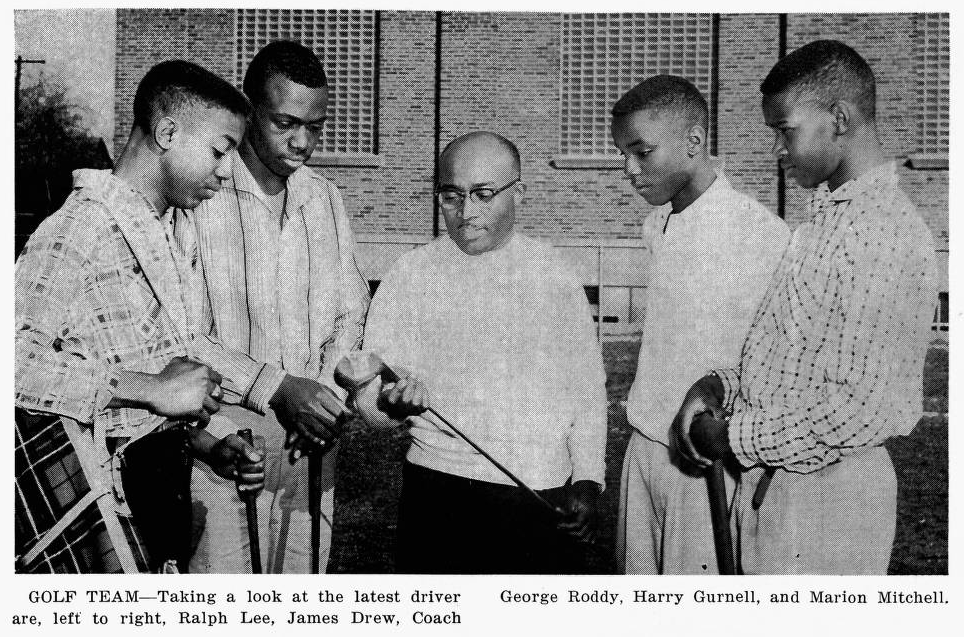
 Chad Proehl
Chad Proehl Jerry Johnson
Jerry Johnson Jim Carney
Jim Carney